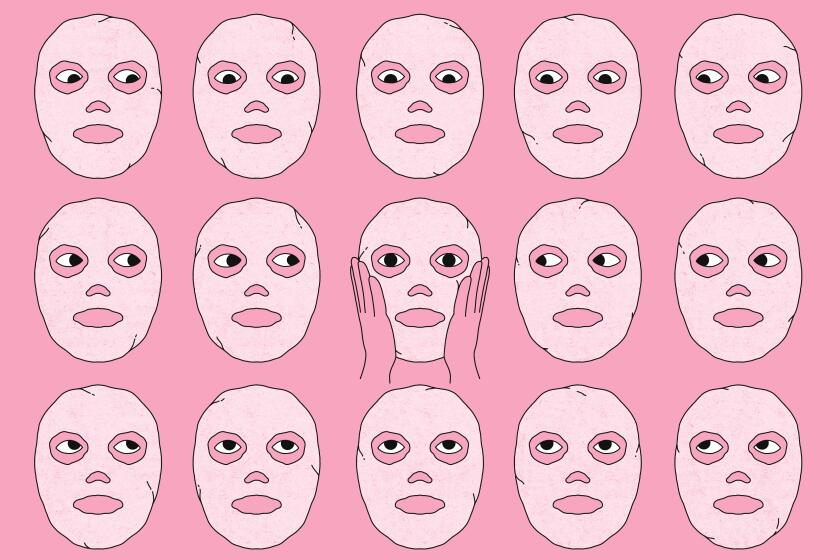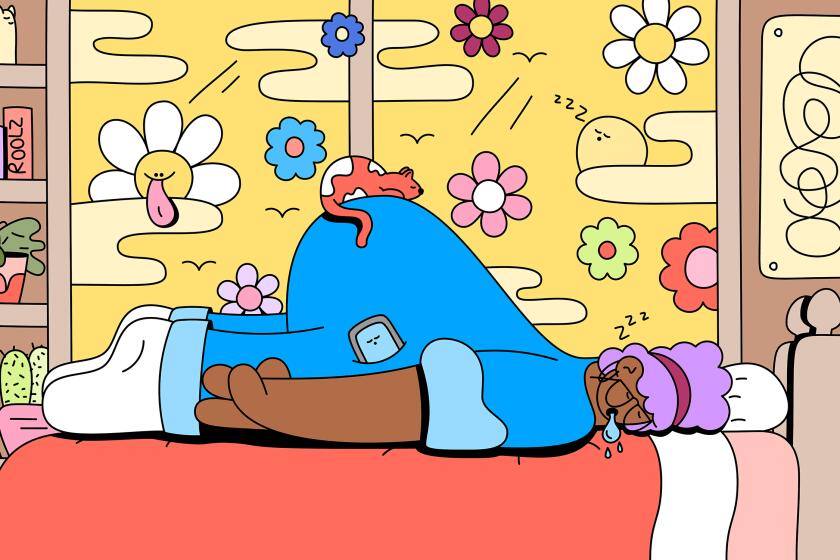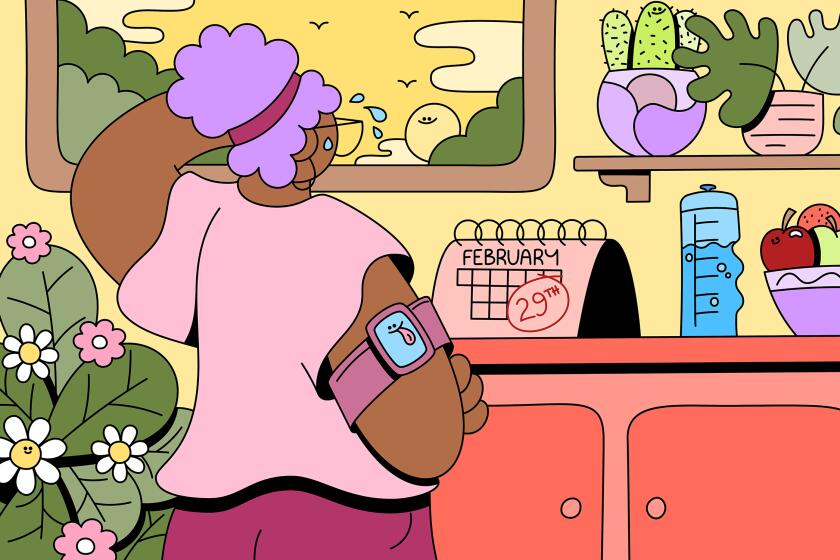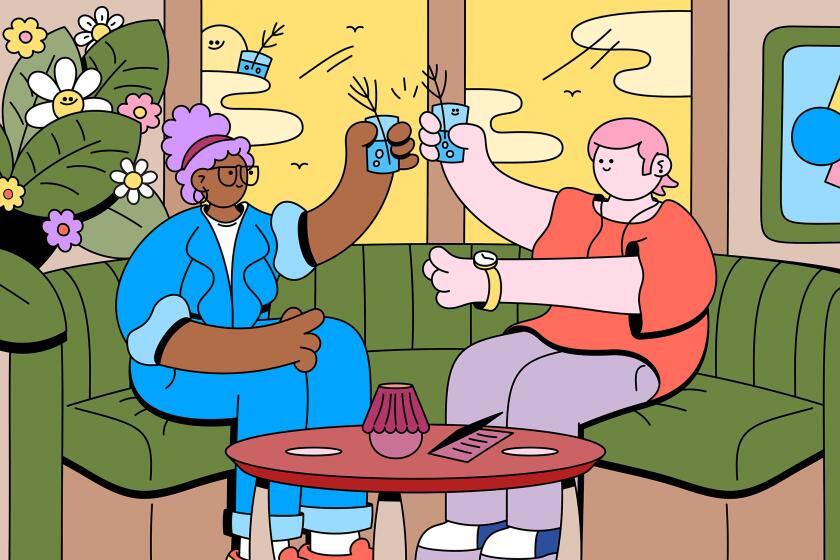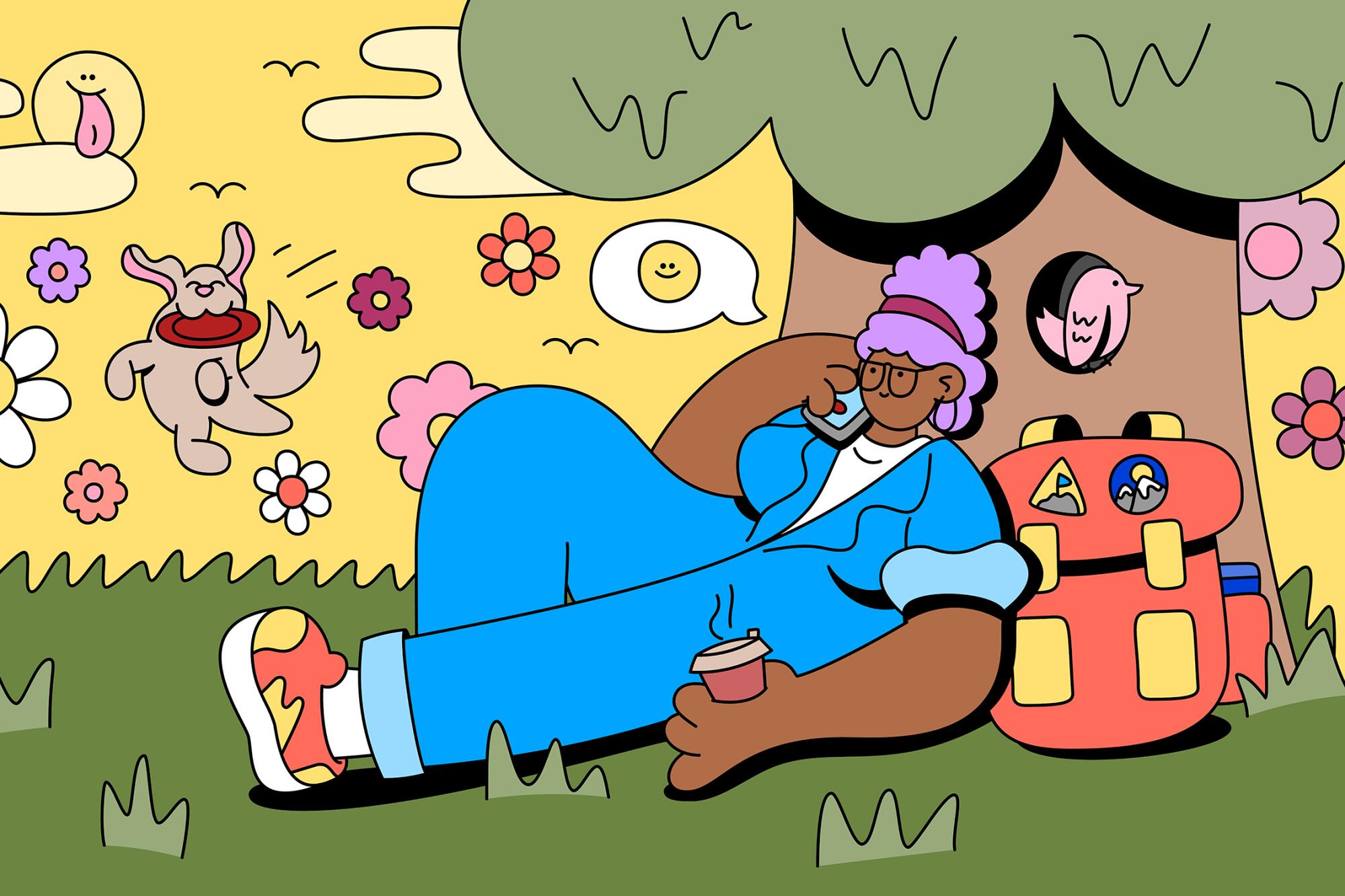
- Share via
I’ve noticed a problem with some of the things I’ve been saying. Recently, when a friend texted to ask if I wanted to “grab a quick bite,” I answered, “Sure!” What I didn’t say was, “Actually, I’d prefer to linger as long as we like while savoring our meals.” When it comes time to pick up a few items at the store, I don’t announce, “I’m going shopping,” but instead, “I have to run a quick errand.” And I’m always “hopping” or “jumping” in the shower (a potentially dangerous act, if I’m being honest with myself).
In a culture in which doing-doing-doing feels like the constant, unending goal — and our mental and physical health suffer for it — it’s time to start questioning how much our very words have to do with it. In fact, language and mental health experts encourage us to slow down and reflect on what we’re saying. But how do you even start to change phrasing that’s so ingrained in your daily life?
A well-intentioned history
Almost all of these phrases originated in the 20th century, says lexicographer and author Kory Stamper, though they’ve really taken off from the 1980s onward. Fascinatingly, she found that “hop on the phone” began in the 1920s (used in the business world); “grab a bite” was used to talk about a meal in the middle of a workday by the early 1940s; and “jump/hop in the shower” goes back to the 1970s — ”though we’ve got a ‘hop in the tub’ in 1940, and ‘have to run’ has been an excuse to get out of a conversation because the rigors of your day call since the 1870s.”
Even if the phrases don’t have to do with work (such as “grab a bite” in its current use), they’re tied to the idea of time constraints and not inconveniencing someone else, Stamper says. “If you say you’re going to grab a quick bite and then get back to doing XYZ, you’re assuring whoever’s listening that the eating of your lunch is just a momentary interruption in your day. Move it out of the workplace and it has a casual open-endedness to it: If I ask someone I’m interested in if they want to ‘grab a bite,’ that’s less intimidating or intense than asking them if they want to ‘have dinner.’”
Of course, it’s less scary to be asked for a minute of your day than the entire day itself. But in the context of hustle culture, what if this language also promotes the idea that we have to do more, faster, for our own lives to be valuable — and fit in things like errands or fun time as quickly as possible? “It’s all about life adhering to a rigorous schedule and you agreeing to go along with that schedule,” says Stamper.
OK, but the time thing is real
“We are really short on time,” says Nedra Glover Tawwab, a licensed therapist and New York Times bestselling author (her latest book, “Drama Free,” is out in February). “The prioritization of time has always been a thing for humans, and because we’re aware of, ‘Oh, my gosh, I have to do my laundry, I have to cook, I want to meal prep and work out and see seven people,’ and all of the things we have to do, we try to save time by cutting our time where it really matters.”
Author and linguist Amanda Montell agrees: “You must be sort of amping yourself up to take a really fast shower when you’re like, ‘I’m gonna jump in the shower.’ It’s like you’re assuring everybody and yourself, ‘This will only take five minutes. I swear I’m gonna be in the office soon.’” (Although if you’re taking a quick shower to save water during California’s protracted drought, the phrasing may take on a more crucial, literal meaning. But, really, don’t actually jump.)
We rush through the less interesting stuff
Not only are we busy, we’re also aware that certain activities aren’t as exciting or desirable as others. Montell says that we often minimize time-consuming activities to make them seem more palatable, which may have spilled over from how we talk in the workplace. “It reminds me of corporate bulls— language, like, ‘Can we just hop on a call?’ that reflects general toxic productivity culture in the States,” she says. “You know, it’s almost cartoonish, like, ‘hop on the phone’ — am I a bunny rabbit in a business movie? Or ‘poke your head into my office,’ ‘pop into my office.’ It’s trying to smooth over the fact that a lot of what goes on in the workplace is drudgery or really taxing or tedious.”
Reimagining and redefining beauty on your own terms has the power to nourish, heal and unearth the truest version of you.
Certainly, running errands can be boring enough that we’d want to get them done as quickly as possible, but why do we linguistically speed through phone calls and dinners with friends? It’s just become something we all say without thinking. Montell, who wrote the book “Cultish: The Language of Fanaticism,” says, “I think this language is used to emotionally distance yourself from what’s going on. And to not have to think about it too critically; that’s what cultish language does. It allows you to mask a truth or mask the reality that there is no truth underneath a buzzword or a piece of us-versus-them terminology. It discourages individuality and pushback.”
If the world we live in doesn’t value spending a day with a friend, phrasing that minimizes the experience develops to show that. And when everybody around you says things like “grab a bite” or “hop on the phone,” you don’t stop to question the ideology behind it, Montell explains. “I absolutely believe that the language that we use can sort of insidiously embed dogma in our minds. Especially if it’s language that we’ve always just grown up using organically and taken for granted.”
So what do I say instead?
1. Try an open-ended request
Tawwab suggests changing our language to focus on being together for any length of time. “Let’s have Sunday together, or let’s get something to eat. Not a quick bite, but let’s have dinner. There’s no time limit, it could be two hours, it could be five.” Channel your younger self and see where that takes you. “I think that’s something we used to have time for as teenagers and definitely younger adulthood,” she adds. “I remember getting in trouble for staying out past curfew, and I wasn’t doing anything but hanging out with my friends.”
2. Consider the beauty of doing nothing
“I speak Italian,” says Montell, “and in Italian, they have phrases like ‘the beauty of doing nothing,’ and we don’t have phrases like that.”
It’s worth thinking about what you find beautiful in your life. And, if whatever it is that you’re doing is something you’re minimizing in your language, maybe you don’t really want to do it at all?
Feeling sad or hopeless ? These 12 beautiful places in Los Angeles will lift your spirits.
3. Notice your hurried language, and when others are hurrying you
Tawwab brings up the friend who gets on the phone with you and then says, “OK, let me let you go, I know you’re on the way to work.” “I’m like, I haven’t initiated that, and I am the person on the way to work,” she says. Why do we do this? “Maybe it’s about preventing people from being late or not wanting them to end it first or, you know, trying to be mindful of their time,” she says. That’s not necessarily a bad thing, but it does add to the whole societal busyness trap that keeps us revving our engines and running errands. “I’ll have people be like, ‘Oh, I don’t call you because I just know you’re so busy,’” says Tawwab. “I’m like, ‘I’ve watched all these Lifetime Christmas movies, so you’re giving me a lot of grace with this whole “you’re too busy” thing.’”
4. Be more intentional
“There’s something meditative about noticing yourself rushing and intentionally slowing down because you really don’t need to rush,” says Tawwab. “When we catch ourselves using some of those phrases, like ‘quick shower,’ ‘run,’ ‘really quick,’ ‘just a minute,’ try checking in with yourself and saying, ‘Wow, there I go again, trying to speed myself up. Let me just slow down.’” She also suggests engaging in practices like watching your coffee brew or intentionally making a cup of tea and being in the process instead of thinking, “OK, while this coffee is brewing, I could go over here and do this thing and that thing.”
While you’re slowing down, think about the words you’re using: “I don’t want to tell anybody how to use language, but I think it’s healthy to reflect on why we use the language that we do and to empower people to think, ‘Is the language I’m using really reflecting what I believe and who I want to be? Or am I just saying it because it’s what’s always been said?’” says Montell.
Self-care has become synonymous with shopping for skincare, candles and even Botox. But self-care doesn’t have to be a consumerist endeavor.
5. Embrace that language is about change
If one thing is true, it’s that language keeps evolving. And through our words, we can change the culture we live in too. “The theory of linguistic performativity says that language doesn’t simply reflect reality. It creates reality,” says Montell. “Every time you speak a word or even write a word, it causes a real action or a real, measurable change to happen in the world.”
In fact, Tawwab says that lately she’s seen more language of “ease and flow” (being mindful, simplifying and not forcing things) emerging. “I feel like there will still be a revolution of slowing down,” she says.
So let’s all say it together: “Do you want to hang out for as long as we feel like it this weekend?”
More ways to shake up 2023
More to Read
Sign up for The Wild
We’ll help you find the best places to hike, bike and run, as well as the perfect silent spots for meditation and yoga.
You may occasionally receive promotional content from the Los Angeles Times.


